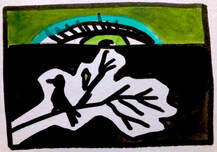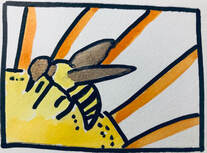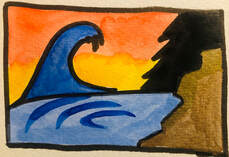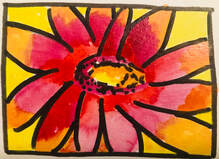|
Tejal D. 10th - Gurgaon, India
It is night and you're waiting to go into whispers, shadows, strange memory and lore forgotten. a songbird quivers in your soul. but carved in her voice that sings so small is greenery, berries, peck kisses and more. a piece of sigh breaks from your throat floats over your tongue. it tastes bitter, you're sure. but the light has yet to crack the sky moor. the city is sullen not to call soon for you. listen, listen to the rustling of your roots, the sigh licking your lips and the flutter of an eyelash as your eye looks over the invisible, existing horizon. ibelle, 7th - Brussels, Belgium
Oh, how dreadful Bartholomew’s life was! He was a gregarious bumblebee forced to live in solitude. His whole life consisted of the same tedious days; wake up, eat breakfast, watch TV, eat lunch, take a nap, eat dinner, and finally, go to sleep. He tried to make friends so his life would not be so lonely, but nothing worked. “Why! Oh why! Why must I be allergic to pollen!” Bartholomew would cry out. “I have only one job!” The loneliness and monotony were getting to him. His longings to work at Lisa’s Flower Farm increased so much that it was always on his mind. And he yearned to see the farm filled with glorious flowers of all varieties, colors, and textures. Bartholomew already knew what his favorite flower would be, a daisy. He’d seen beautiful pictures of the daisies at Lisa’s Flower Farm, so he decided to try his best so that one day, he could meet a daisy. Oh, what a marvelous idea Bartholomew had! Bartholomew had spent countless days gazing out his window. He remembered seeing a little girl playing with bubbles. Bartholomew loved the concept of bubbles. He loved even more that he might get to see one up close! Bartholomew rarely left his house and was worried about what might happen. After a slight bit of pre-game, he took a deep breath and flew out his door. Bartholomew held his breath for as long as possible, hoping it would help in some way. Instead, he ran out of breath, causing him to breathe heavily, increasing his chances of inhaling the fatal pollen. As if mother nature felt for the allergy-cursed Bartholomew, she provided a light breeze that gently lifted out-of-breath Bartholomew and brought him towards the little girl. Bartholomew had never interacted with a human before. He’d always tried to be kind to everyone, so he went in to land on her to signal that he wanted to be friends. The little girl screamed, which frightened Bartholomew, causing him to swerve and plummet down towards the ground where a flower lay. The daffodil lunged toward him. Bartholomew took a sharp right. He was flying straight into another bunch of flowers. They all lunged toward him. The petals enclosed, creating countless cages for poor Bartholomew where he would be doomed to the tragic death of pollen suffocation! He swerved once more and rose higher into the air. Ploop! Bartholomew flew straight into a bubble! His plan worked! He tried to steer the bubble towards a flower. Achoo! Achoo! What happened to the bubble? Bartholomew wondered. After a few more attempts, he concluded that the bubbles were too delicate for his clumsy flying ability. He solemnly flew back to his house, feeling defeated. His enticing daydreams of Lisa’s Flower Farm felt even farther away than it did before. It would be weeks before Bartholomew would try again. It was a quiet Sunday afternoon (like always) when suddenly, a thought popped into Bartholomew’s mind! “Why don’t I just use a stem to try and pick the pollen out of the flower!” Bartholomew exclaimed. “That way, I wouldn’t get too close to the flower!” Bartholomew got to work. Bartholomew was even more confident this time. He flew out of his door, more aware of the dangers lurking ahead. He carefully picked up a nearby leaf stem that had broken off of its other half. Bartholomew picked it up and quickly noticed that it was weighing his small body down. He tried with all his might to fly a little bit higher, but exhaustion seized him, and he dropped the stem to the ground. He tried three more times, but the weight of the stem continued to pull, which activated his allergies. Feeling weary and unable to rest on a flower, Bartholomew didn’t know what to do. Hope diminishing, he flew back to his house. Bartholomew sorrowfully returned to his monotonous life. His days dragged along, each one feeling worse than the next. “Oh! I can’t live like this anymore!” Bartholomew would cry out. He was in a constant downward spiral. He didn’t know how much longer he could go on. “I’m so lonely! I’m so bored!” Bartholomew was not doing well. Another two months dragged on. Bartholomew was still living in tormenting solitude. It was not one of his best days, and Bartholomew was looking out the window when he realized something. “What if I had something that covered only my nose and mouth? So that way it wouldn’t weigh me down, it could stay on easily, and protect me from the pollen!” Bartholomew was overcome, with joy! He buzzed around cheerfully. Though, every remnant of hope was riding on this last attempt. He opened his closet, revealing the piles of junk he had thrown in there over the years. After ruffling through his untidy closet, he found what he was looking for, his sewing machine. Bartholomew pushed and pulled persistently until the sewing machine finally freed from its spot. Bartholomew got to work. He drew a template and found some fabric in the closet. After a few hours, Bartholomew had only succeeded in failure. Numerous fabric scraps and gnarly balls of thread were scattered all around his home. He sighed but kept at it. An hour later, Bartholomew had completed his first mask! He tried it on and looked in the mirror. “I look great!” Bartholomew said, smiling. He was incredibly excited and couldn’t wait to make new friends. It was the next day, and it was the first time in a while that Bartholomew woke up with a smile on his face. Bartholomew usually took his time when eating breakfast, but not today. He devoured his food quickly and put on his mask. His heart was racing. Bartholomew looked in the mirror to see if anyone would be able to notice his smile. He cheerfully flew out his house this time, straight to Lisa’s Flower Farm. Oh what a delightful day Bartholomew had! He was over the moon, he’d returned home with five new friends. And already made plans to visit other flower fields. Bartholomew also met tons of lovely flowers; Lilacs, Honeysuckles, and his favorite, Daisies. Bartholomew went to bed that night, his mind racing of all the delightful days ahead of him. Liesel, 11th- Singapore
The water; calm Its surface smooth like one’s palm Its depths are crystal clear Its current; silent to the ear Nearby, a boy stands on the dock In his hand, a jagged rock Like many others have done, he tosses it in Oblivious as to what lies within The stone whips through the air The boy laughs, unaware As the rock pierces the glass skin, The water’s patience wears thin Annoyed, the surface begins to ripple Like how an angry cat’s fur begins to bristle The water is met with a gentle breeze The wind’s attempt to put his friend at ease But suddenly, another flying stone The boy wasn't satisfied with the first one thrown It penetrates the surface and begins to sink But this time the water has been pushed over the brink Now, it ignores the wise words of the wind The water will go against what his friend had forbid The gentle ripples turn to violent waves It is time for the water to do what he had longingly craved A whip of water erupts into the air The boy stands frozen, his face etched with dispair The calm lake now thrashes like a violent sea He cackles wildly, "I am finally free!" An arm of water grabs the boy Holding him in the air like a toy The water tells him, “Its only fair” And then the boy is flung into the air Anneka, 10th - Vancouver, Canada
From a young age, we are taught that quitting is wrong. It is the last resort, a sign of failure, and the phenomenon that drives the demise of success and profit. Our parents tell us that we have to make it through the year. They tell us that we must keep going, even if we don’t want to. They tell us that you can’t run from things, you must stick them out. This is how we learn about perseverance. I am not against perseverance. But, simultaneously, it teaches us that wanting to step back is not okay. That we must stay through uncomfortable situations. We must linger in the space that doesn’t speak to our soul, and linger in the space that feels suffocating. I stuck through many chapters of my life that did not uplift me, but rather dragged me down. At the time, I believed that quitting was weak. I saw it as an escape. Quitting was never an option. I was not a failure. What I didn’t know, however, was that I was putting my mind and body through stress. It ate away at me until I was sad and tired. Still, I brushed off a thought that seemed to hang around above my head like a heavy grey rain cloud. It would whisper things to me in an urgent voice. I would wave them away. I put up an umbrella. And then, all at once, it became too heavy. The sky opened up and the rain fell down, soaking me. It swept me off my feet. I was racked with guilt and disappointment. I was lingering in a space that didn’t speak to my soul, and it was too much. I believed that prosperity and happiness only came to those who worked and worked and never gave up. But I was blind to the fact that I had proven that wrong, all by myself. All that never giving up had given me was sadness and shame. I have then since grown up and changed the way that I think about quitting. It no longer has a negative connotation. I give myself the option to step back from something if I feel it does not align with my path. Quitting, to me, is the equivalent of growing. Like a flower, we are always expanding upwards and outwards. Flowers tilt towards the sunshine. They grow towards the elements that nourish them. Their petals wilt and eventually drop, and leaves wither up until they are but a shriveled piece of what they once were. I imagine myself as a flower. I am blossoming, blooming, flowering. I drop leaves and petals that no longer serve me. I am not afraid to grow new limbs. Quitting is an act of strength. It takes strength to let go of the normalcy and routine. It takes strength to allow yourself to grow onwards and upwards; to drop a petal. Quitting is an act of courage. It takes courage to defy what our parents tell us. It takes courage to defy what society tells us. It takes courage to diverge and to take a different path than others. Quitting is an act of liberation. When you let go, you release negativity. The raincloud dissipates. You are free from the weight on your shoulders. You are no longer suffocating. You may grow new petals and leaves. Quitting is an act of opening up doors. New opportunities will present themselves to you, and you may pounce on them with renewed energy and vibrance. Quitting is an act of mindfulness. You have learned that this chapter of your life must come to end. You have taken what you need from it. Value it. And I hope, dear Reader, that you feel courageous enough to let go. I hope that you feel strong enough to quit. I hope that you trust your intuition. I hope that you blossom. R. Hershey, 7th - Oakland, CA
The Harlem Renaissance was the time African Americans fought for their freedom back in the 1920s. The Harlem Renaissance is the time African Americans had migrated from the south to the north because of slavery. Once more and more African Americans came, the less food and shelter there was. The African Americans started to have talents they were interested in for example art, music, dance, poetry, singing, etc. Of the works we've studied, “Lift Every Voice and Sing”, “Hope”, and “His Motto” most clearly demonstrate the theme that collaboration and community can bring out the best in people. “Lift Every Voice and Sing” clearly shows how collaboration and community bring out the best in us. "Lift Every Voice and Sing" was performed first as a poem as part of a celebration of Abraham Lincoln's birthday by James Weldon Johnson then turned into the Black national anthem. In the poem, it says “Let us march on till victory is won”. This is showing the African American community is marching together as a big group which makes them bigger and stronger. They are marching because Abraham Lincoln is the new president. This is an example of collaborating with other people. In conclusion, this song, which is also a Black National Anthem, shows that being in a group with others and working hard for something shows the best in us humans. "Hope" develops the same theme of finding the best in ourselves through community and collaboration. “Hope” by Georgia Douglas Johnson is a poet made about children who weren’t having the best time in their lives and are dealing with very hard situations. “And each has his hour — to dwell in the sun!” Georgia Douglas Johnson made a poem about these young kids and is telling them each of them will have their own time to shine. She is supporting her community by making them a poem and telling them not to give up. This shows in the poem “Hope” that community can be a big part of life and can teach you new things and helps you do things you love to do. Lastly, “His Motto” clearly shows how collaboration and community help us become our best selves. “His Motto” by Lottie Burrell is mainly about John Durmont judging by skin color then later realizes skin color doesn’t define a person. “His face still held the look of doubt and unbelief as he looked at the crude, home-made instruments.” This evidence supports my claim because as Robert Hilton offered John Durmont help to send an urgent message he had no faith in him because he is a colored boy. For this reason, collaboration and community brings out the best in people because when you help someone you‘ll get something in return. Of the works we've studied, “Lift Every Voice and Sing”, “Hope”, and “His Motto” demonstrate collaboration and community bring out the best in humans. As you can see in “Lift Every Voice and Sing” community took place as they marched for victory. In “Hope”, you can see there is community as Georgia Douglas Johnson gives quotes and tells them to never give up. Last but not least, “His Motto” shows both community and collaboration as Robert helps Durmont and he doesn’t care what Durmont thinks of him or is saying about him. Collaboration and Community were important during the Harlem Renaissance because community was all they had and collaboration was very important because that's how they made music and poetry. |
AuthorsStudents 6th-12th Grades month
April 2024
|



